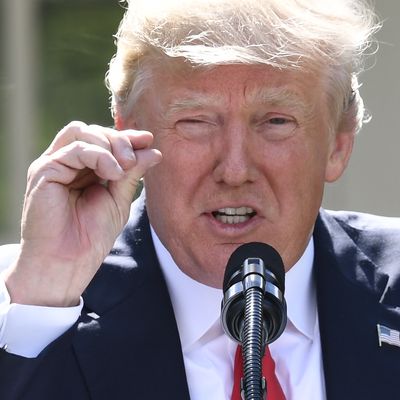
A senior Trump administration official has told Politico that the White House will attempt to convince House Republicans to make “administration-friendly changes” to a bipartisan new Senate bill, which slaps Russia with Trump-proof sanctions in retaliation for the Kremlin’s interference in last year’s U.S. presidential election. Secretary of State Rex Tillerson has already indicated his mixed feelings for the measure, saying publicly that while he agreed “with the sentiment” that Russia be held accountable for its election meddling, he also wanted Congress “to ensure any legislation allows the president to have the flexibility to adjust sanctions to meet the needs of what is always an evolving diplomatic situation.”
White House deputy press secretary Sarah Huckabee Sanders echoed Tillerson’s sentiment on Thursday, telling reporters that, “We believe the existing executive branch sanctions regime is the best tool for compelling Russia to fulfill its commitments.” The White House has taken no formal position on the bill, otherwise.
The measure in the new bill, which was passed in the Senate by a vote of 97-2, aims to strengthen current sanctions and implement new ones on Russia, targeting individuals “conducting malicious cyber activity on behalf of the Russian government,” as well as those engaged in corruption, human-rights abuses, selling weapons to the Assad regime in Syria, or doing business with Russian intelligence or defence agencies. Certain Russian industries, like its mining and metals industries, would also be targeted.
As far as the attempted Trump-proofing, the measure makes congressional review a requirement should Trump or any president want to reduce or end the penalties in the future. It’s not the first time Congress has sought such a requirement, however, as a similar mechanism was passed in 2015 regarding sanctions on Iran after President Obama pursued his landmark nuclear deal with the country.
It’s not clear what exact changes the White House wants to make to the bill, or that those changes would actually weaken the proposed penalties against Russia, but Senate Democrats have been attempting to sound an alarm over just that possibility. Then again, no White House ever seems to support new limitations on its power or flexibility, regardless of the situation.
Regarding the unofficial White House’s stance on the new bill, per Politico:
The administration official emphasized that the White House supports sanctions on Russia and that the political ramifications of any veto have not been discussed yet. As the State Department actively engages with lawmakers, the White House is confident it has allies in the House who are also concerned about the prospect of breaking with precedent and limiting the executive branch’s control over sanctions.
In other words, the Trump administration may (again) be betting that loyalty to the president — or more likely, fear of his political base — will be more important to House Republicans than the omnipresent suspicions over, and investigation into, possible ties between the Trump campaign and Russia, as well as the president’s seeming attempts to dismiss that investigation. So far, at least, that has been a bet worth taking for the White House, though the new penalties against Russia are also built into a bill that gives Trump something he wants: new sanctions on Iran — so that raises the stakes for the president should he threaten a veto.
In a state-television interview that aired Saturday, Russian president Vladimir Putin said that the proposed sanctions were “harmful” and would “complicate Russia-American relations.”






























